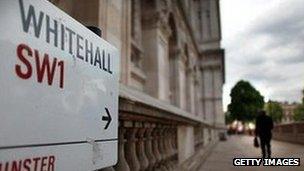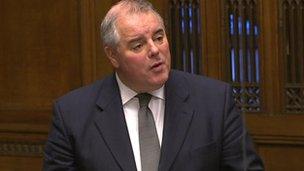Top Whitehall civil servants get tax bills paid
- Published

Perks such as a company car are regarded as a benefit in kind and liable to tax
Top civil servants are having some tax paid using public money, a newspaper investigation has revealed.
The arrangement has been criticised by senior Conservative MP Richard Bacon, who is a member of the Commons Public Accounts Committee.
He said it was surprising that the taxpayer was being asked to "fork out further" for bills many employees would be expected to pay for themselves.
The system has the approval of HM Revenue and Customs.
Company car
A company car, for example, is regarded by HM Revenue and Customs (HMRC) as a benefit in kind from an employer to a member of staff and so is subject to tax.
The Telegraph discovered that the tax bill associated with the chauffeur-driven car available to Cabinet Secretary Sir Jeremy Heywood was picked up by the government rather than by him.
The car costs more than £80,000 a year to run, about £25,000 of which is tax.
The Cabinet Office said the car was also used to transport other senior officials and Sir Jeremy did not use it privately.
Others said to have benefitted from the system included the head of NHS England, Sir David Nicholson, and the former head of the Serious Fraud Office, Phillippa Williamson.
'Common practice'
Mr Bacon said whether cars used by senior civil servants were regarded as a perk depended on what they were used for.
"In many cases people have company cars which they use for their work and that's quite normal," he said.
"For the head of the civil service and the cabinet secretary, who run the country together, to spend 45 minutes in a car in the morning each day is probably a very good use of taxpayers' money.
"But when the ex-chief executive of the Serious Fraud Office, who works in a London-based national organisation, turns out to have a place of work that is her home near Lake Windermere, and when she travels to work at the Serious Fraud Office in London, we're as taxpayers paying the tax.
"I think people might take a rather different view of that."

Richard Bacon said whether the cars were regarded as a perk depended on what they were used for
Phillippa Williamson stepped down as chief executive of the Serious Fraud Office in 2012.
A report, external published by the House of Commons Public Accounts Committee in July said taxpayers had spent nearly £100,000 in travel and hotel costs following a contract specifying that her place of work was her home address in the Lake District.
Ms Williamson worked there for two days a week and in London for three days a week.
Taxpayers paid for her travel to London and hotel costs between 2008 and 2012.
Mr Bacon said: "Because they are partly a perk, it's been recognised for many years that people get taxed on their company cars and it's surprising that shouldn't be the same in the public sector.
"The HMRC doesn't seem to have a problem working out which is which when it comes to the private sector and when it comes to private citizens.
"I think the point is that everyone should be treated in the same way, like cases should be treated like.
"What we don't want is this sort of sense that there's a small number of people that are treated differently to everyone else, and that's what this starts to smell of in certain cases."
Being on call
HMRC said more widely 20,000 employees had payments made on their behalf by their employers, most in the private sector.
A spokesman said in a statement: "We can't discuss individual cases. However, cars provided by an employer that are available for employee use are a benefit in kind for the employee and are taxable. These rules have been in place for 37 years.
"Employers may choose to pay the tax due on the benefit. If so any such payment will constitute an additional benefit - which will also be taxable on the employee.
"This is quite a common practice by employers and is a matter between employer and employee. HMRC makes sure all the tax due is paid."
Dave Penman, general secretary of the First Division Association, the trade union for senior civil servants, told the BBC that the use of government cars had fallen because of recent cuts.
Their use "was not a perk", but essential for senior staff doing "demanding jobs", requiring them to be on call seven days a week.
Earlier this week, it emerged that central government spent more than £500m on consultants and short-term staff last year despite a crackdown on the practice.
The Times reported that the figure was nearer £800m when "off payroll" staff were included - at the same time £287m was spent on staff redundancies.
Also this week local councils urged the government to become as "efficient" as them at collecting taxes, arguing this could make Whitehall an extra £20bn a year.
- Published15 August 2013
- Published14 August 2013